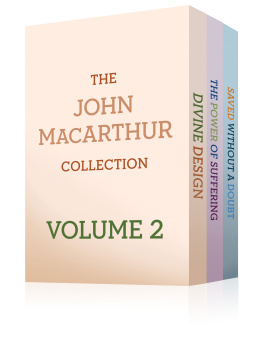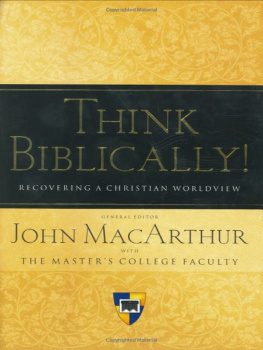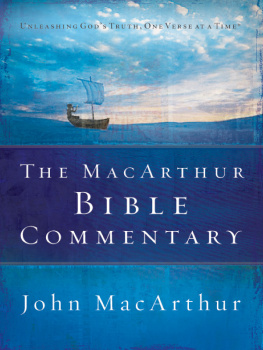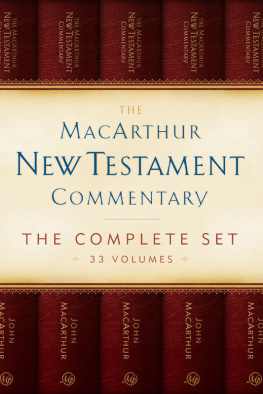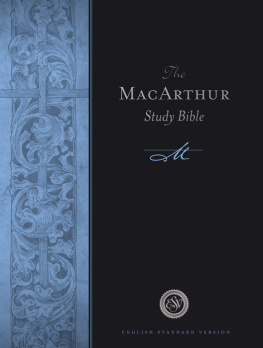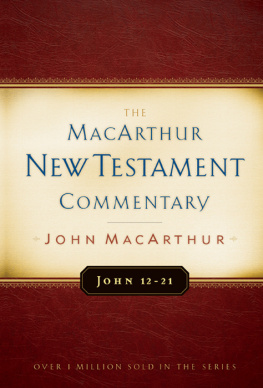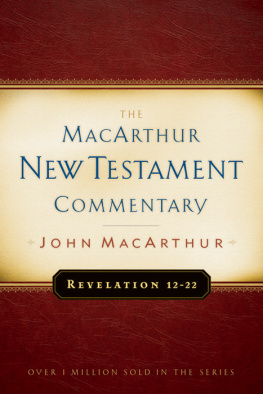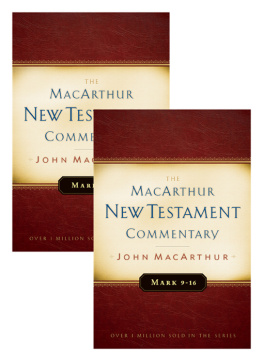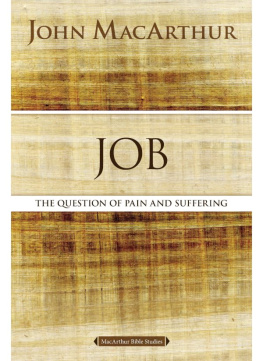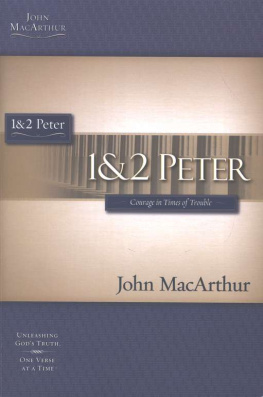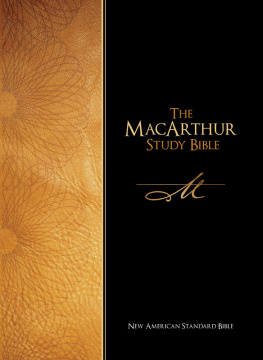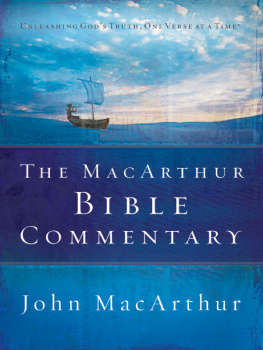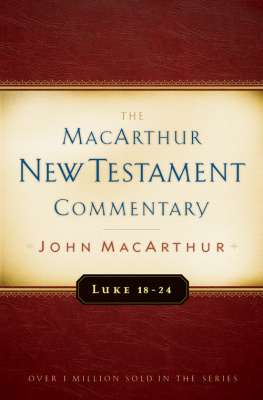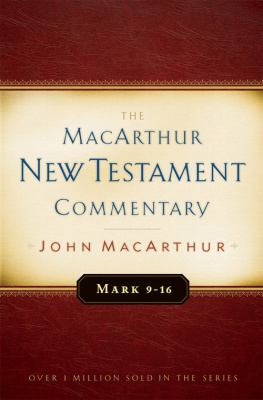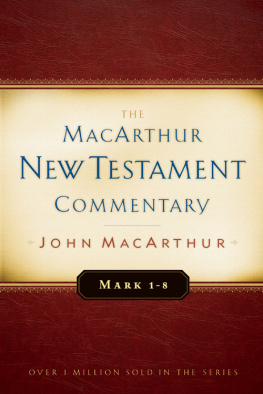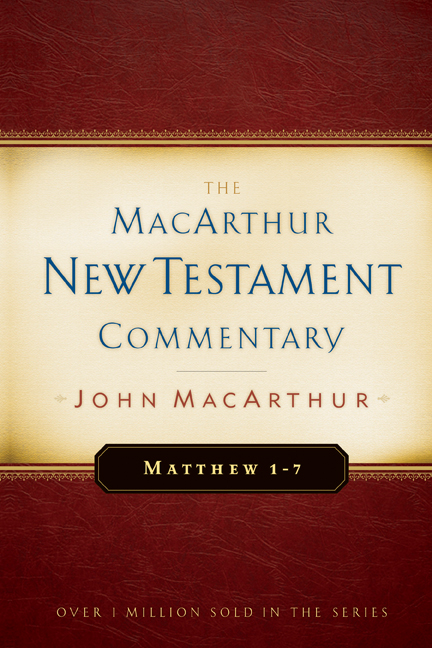
M OODY P RESS /C HICAGO
1985 by
THE MOODY BIBLE INSTITUTE
OF CHICAGO
All rights reserved. No part of this book may be reproduced in any form without permission in writing from the publisher, except in the case of brief quotations embodied in critical articles or reviews.
Unless noted otherwise, all Scripture quotations in this book are from The New American Standard Bible, 1960,1962,1963,1968,1971,1972,1973,1975, and 1977 by The Lockman Foundation, and are used by permission.
Quoted excerpts from p. 247 of R.C.H. Lenskis commentary are reprinted by permission from The Interpretation of St. Matthews Gospel by R.C.H. Lenski, copyright Augsburg Publishing House.
Library of Congress Cataloging in Publication Data
MacArthur, John F.
Matthew 1-7.
(The MacArthur New Testament commentary)
Bibliography: p.
Includes indexes.
1.Bible. NT. MatthewCommentaries. I. Title.
II. Series: MacArthur, John F. MacArthur New Testament commentary.
BS2575.3.M24 1985 226.2077 85-15225
ISBN 0-8024-0755-2
Printed in the United States of America
To Fred Barshaw,
diligent colaborer and
loyal personal friend
Titles in the
MacArthur New Testament Commentary Series
Matthew 1-7
Matthew 8-15
Matthew 16-23
Matthew 24-28
Acts 1-12
Acts 13-28
Romans 1-8
Romans 9-16
First Corinthians
Second Corinthians
Galatians
Ephesians
Philippians
Colossians and Philemon
First and Second Thessalonians
First Timothy
Second Timothy
Titus
Hebrews
James
First Peter
Revelation 1-11
Revelation 12-22
MOODY
1-800-678-6928 www.MoodyPublishers.org
CHAPTER
It continues to be a rewarding divine communion for me to preach expositionally through the New Testament. My goal is always to have deep fellowship with the Lord in the understanding of His Word, and out of that experience to explain to His people what a passage means. In the words of Nehemiah 8:8, I strive to give the sense of it so they may truly hear God speak and, in so doing, may respond to Him.
Obviously, Gods people need to understand Him, which demands knowing His Word of truth (2 Tim. 2:15) and allowing that Word to dwell in us richly (Col. 3:16). The dominant thrust of my ministry, therefore, is to help make Gods living Word alive to His people. It is a refreshing adventure.
This New Testament commentary series reflects this objective of explaining and applying Scripture. Some commentaries are primarily linguistic, others are mostly theological, and some are mainly homiletical. This one is basically explanatory, or expository. It is not linguistically technical, but deals with linguistics when this seems helpful to proper interpretation. It is not theologically expansive, but focuses on the major doctrines in each text and on how they relate to the whole of Scripture. It is not primarily homiletical, though each unit of thought is generally treated as one chapter, with a clear outline and logical flow of thought. Most truths are illustrated and applied with other Scripture. After establishing the context of a passage, I have tried to follow closely the writers development and reasoning.
My prayer is that each reader will fully understand what the Holy Spirit is saying through this part of His Word, so that His revelation may lodge in the minds of believers and bring greater obedience and faithfulnessto the glory of our great God.
The central personality of Old Testament prophecy is the coming great King who will rule in Gods promised kingdom. Over and over we are told of a special individual who has the righteousness, the wisdom, the power, the authority, and the right to reign not only over Israel but over the entire earth.
This coming great King will have the power to bruise Satans head (Gen. 3:15), take back mans dominion that was lost through sin, and establish at last a kingdom on earth that will extend into eternity. From Him the scepter shall not depart from Judah, nor the rulers staff from between his feet (Gen. 49:10). That could not be said of any Old Testament king, and could only apply to the coming great King. The host of other predictions that refer to a reign described by such terms as everlasting, eternal, and forever obviously could not apply to a merely human king.
The words of the Lord spoken to David through Nathan had to refer to other than David himself: And your house and your kingdom shall endure before Me forever; your throne shall be established forever (2 Sam. 7:16). Davids kingdom was shattered and divided as soon as his successor, Solomon, diedand as yet has never been reestablished.
Yet in Psalm 2 God tells us, But as for Me, I have installed My King upon Zion, My holy mountain. I will surely tell of the decree of the Lord: He said to Me, Thou art My Son, today I have begotten Thee. Ask of Me, and I will surely give the nations as Thine inheritance, and the very ends of the earth as Thy possession (vv. 6-8). David calls the coming One the King of glory and the Lord of hosts (Ps. 24:10). The coming King is spoken of in similar ways in Psalms 45, 72, 110, and others.
The prophets speak of the great King as both human and divine. Isaiah tells us that He would be born of a virgin (7:14) and that He would be despised, forsaken, stricken, pierced through, crushed, chastened, scourged, oppressed, and afflicted (53:3-7). Daniel speaks of Him as One like a Son of Man (7:13). Yet Isaiah also tells us that the government will rest on His shoulders; and His name will be called Wonderful Counselor, Mighty God, Eternal Father, Prince of Peace. There will be no end to the increase of His government or of peace (9:6-7) and that He will be called Immanuel, which means God with us (Isa. 7:14; Matt. 1:23). Through Micah, the Lord promised Bethlehem: From you One will go forth for Me to be ruler in Israel. His goings forth are from long ago, from the days of eternity (5:2). Zephaniah tells his people that when this King comes He will be the King of Israel, the Lord in their midst (3:15). Zechariah tells us that He will be just and endowed with salvation (9:9) and that when He reigns, every family on earth will be able to go up to Jerusalem to worship the King, the Lord of hosts (14:17). The coming great King would be the Man-God.
None of those ancient writers comprehended the full nature of the One of whom they prophesied. As to this salvation, Peter tells us, the prophets who prophesied of the grace that would come to you made careful search and inquiry, seeking to know what person or time the Spirit of Christ [that is, Messiah] within them was indicating as He predicted the sufferings of Christ and the glories to follow (1 Pet. 1:10-11).
The full identity and nature of the predicted King are initially presented and explained in the gospels, of which Matthew is the first. Like a divine spotlight they focus on Jesus and, through one event after another, show Him to be the only One who fulfills all the requirements of those prophesies. By the same token all impostors are unmasked by their inability to fit the predictions.
The whole New Testament acknowledges Jesus as the promised great King. In its twenty-seven books the term basileia (kingdom) is used one hundred forty-four times in referring to the reign of Jesus Christ;


